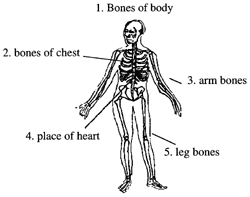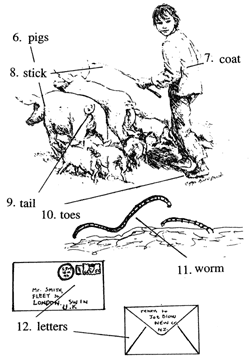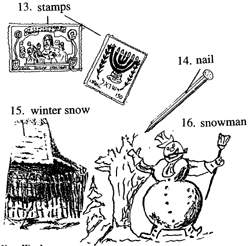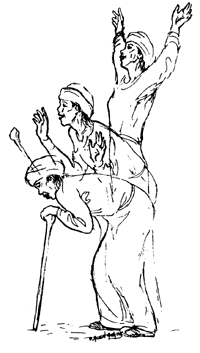Unit 23: More On Prepositions
Pictured Words
New Words

| 1. bones of body
|
| 2. bones of chest
|
| 3. arm bones
|
| 4. place of heart
|
| 5. leg bones
|

| 6. pigs
|
| 7. coat
|
| 8. stick
|
| 9. tail
|
| 10. toes
|
| 11. worm
|

| 12. letters
|
| 13.stamps
|
| 14. nail
|
| 1 winter snow
|
| 16. snow man
|
Nouns
Sayings
Was there much snow before this winter?
It will be warmer after the snow goes.
We have many bones in our bodies and we have no desire to take any out.
Broken bones may be put together with nails.
We put nails into wood generally, not into stone.
We may send a letter after we have put a stamp on it.
A pig does not take its food with other animals.
There are worms in the ground but they do not get into pigs before they take their food.
More On Prepositions
In a previous group of Stories, we underlined the prepositions.
That was done for two reasons: to let you see their importance and to give examples of their use in the groupings of the words in which they have a function.
But there are several which must be thought of separately: before, after, in, out and with.
before and after
The opposites: before and after have two purposes.
They may have the meaning of positions in space or they may give the position in time.
"Before" has both purposes:
the sons of the gods came together before the Lord.
Satan went out from before the Lord.
Pride goes before destruction.
After usually has the meaning of time, and only has relation with space, when it has the idea of one thing coming after another.
after that, every time he went by, he went into her house.
gave birth to a son at the time named, in the year after.
Now on the day after, Hazael took the bed-cover.
but, the idea of both space and time is shown in.
by the living Lord, I will go after him.
when Naaman saw him running after him.
in and out
By using the two words "in" and "out" we can see where something is in space.
"Out" is the opposite of "in".
put them away in the house.
he went out from before him a leper as white as snow.
he came in and took his place before his master.
Be pleased to take me out of danger.
In them has he put a tent for the sun.
His going out is from the end of the heaven.
I will have a place in the house of the lord all my days.
when they come out of the town, we will take them.
With
The sense of "being together" is seen in the preposition "with".
It may also be seen to cover the idea of "having", either as a part of something else or as being in one's possession.
you are not to come before me if your brother is not with you - (as a part of the group)--.
take twice as much money with you - (in their possession).
they will take food with me in the middle of the day - (being together).
we have it with us to give it back -(in our possession).
we may not see the man's face again if our youngest brother is not with us - (being together).

The Bent Woman Made Straight
And there was a woman who had had a disease for eighteen years; she was bent, and was not able to make herself straight.
And when Jesus saw her, he said to her, Woman, you are made free from your disease.
And he put his hands on her, and she was made straight, and gave praise to God.
And the ruler of the Synagogue was angry because Jesus had made her well on the Sabbath, and he said to the people,
There are six days in which men may do work so come on those days to be made well, and not on the Sabbath.
But the Lord gave him an answer and said, O you false men!
do you not, every one of you, on the Sabbath, let loose his ox and his ass and take it to the water?
And is it not right for this daughter of Abraham, who has been in the power of Satan for eighteen years, to be made free on the Sabbath?
And when he said these things, those who were against him were shamed, and all the people were full of joy because of the great things which were done by him.
Additional Reading
The observation we should make about this story is that Jesus put the health of this bent woman before the laws of their Jewish leaders.
You see, The Jewish leaders were very careful about not doing any work on a Sabbath, which was the most important day of the week to them.
But, it was quite right for one of those religious leaders to feed and water his animals on a Sabbath, or so they said.
They did have respect for the health of their animals.
But they had no respect for this woman.
Of course, Jesus could have got out of trouble by putting off the healing of this woman until another week day.
But it was more important to him that the people should get their values right.
The healing could not be kept waiting.
These were hard times, if only because they were in a country in the grip of the Romans.
There is an old saying which comes from the days of the Romans: "He gives twice, who gives quickly".
And Jesus was giving quickly to this woman for she had been in the grip of this disease for 18 years.
The thoughts of the Jewish leaders were completely given over to keeping the law and gave no attention to the needs of men.
The main thing to them was that the system was all important.
There could be no suggestion that a person's need might have greater authority.
But, Jesus said: "O you false men!
do you not, every one of you, on the Sabbath, let loose his ox and his ass and take it to the water?
And is it not right for this daughter of Abraham, who has been in the power of Satan for eighteen years, to be made free on the Sabbath?"
One of the great troubles with society has been that personal needs have been put to one side in an attempt to keep to a man-made system.
And this does not only have relation to political or authoritarian rules.
As in the experience of this woman, it can be in the name of religion.
That is not good.
Good religion pays attention to personal needs, putting them ahead of the decisions of the social group.
This was the last time that we have any knowledge of Jesus speaking in a Jewish Synagogue, or church.
His ideas about the value of men at the personal level were beginning to get him into trouble.
The leaders were keeping a very close eye on him to see that he did not get out of hand.
That is why the ruler of the Synagogue said that men should not come to be made well on the Sabbath.
We may take note that he did not speak to Jesus directly.
He spoke out generally.
But, it is clear that his words were for Jesus to take note of and he must have been a little taken back when Jesus said his remarks straight to him.
His words gave a sense of shame to the ruler, but common persons heard them gladly.
Often after that, the great numbers of persons that came to see and hear Jesus were very happy at what he said about the value of men at the personal level.
And, they were very happy about all the wonderful signs he showed them.
They held the view that he was a prophet.
On the other hand the rulers were not happy.
He met with more and more opposition and finally, the rulers got their way and had him nailed to the cross.
But they could only do this after getting their hands on him in secret, away from the common men of the day.
Helpful Notes
| disease
| serious illness.
|
| ruler of the synagogue
| the leader of a Jewish church.
|
| Sabbath
| the day of rest from all work.
|
| false men
| those whose acts are in error.
|
| power of Satan
| the control of the Evil One.
|
| have respect for
| pay attention to.
|
| get values right
| have a balanced view
|
| man-made system
| decisions by men.
|
| political or authoritarian
| decisions made by governing bodies.
|
| keep a close eye on
| watch carefully for mistakes.
|
| nailed to the cross
| the Roman custom of death by crucifixion.
|
Interesting Facts And Records
Nature And Moving Mountains
There are a great many statements in the Scriptures about faith.
It must be a very important thing.
Faith is the substance of things hoped for, the sign that the things not seen are true.
Jesus said: "If you have faith as a grain of mustard seed, you will say to this mountain, be moved from this place to that;
and it will be moved;
and nothing will be impossible to you".
Marco Polo, gave the story of an army chief whose soldiers took a town in Arabia.
He put its town persons to the test of moving a mountain by faith.
The only person good enough to do that was an old shoe maker.
The town owed its freedom to his faith and his goodness, said Marco Polo.
He was different to the others there.
In Jesus day it was natural to get a measure of a man's goodness by his faith.
If a good person was able to do something special, it did not have the sense of a miracle.
The idea we have in Western society is that a miracle is something that is unusual.
In Jesus day it was a sign of goodness.
Many signs of goodness may be seen in our records of Jesus.
He said to those he made well of sickness, "Your faith has made you well".
He did not say this is a religious act or an example of skill.
He said, "Your faith made it happen".
It was said by Mao in China, "Help nature to work for you".
That is a good comparison to make with the signs that were given by Jesus and by the Apostles.
They gave these signs in praise of God.
But they were best able to give help to persons who had enough faith to get above their natural condition.
We might say, their faith had the role of insurance to them.
The Apostle Paul saw a man who had never walked and he saw as he looked at him that the man had faith to be made well.
So he said in a loud voice, "Get up on your feet".
Jumping up, he went walking about!
Jesus said to his friends, "Where is your faith?"
We may say, as they did, "Make our faith greater".
With faith we have the sign that things not seen are true.
We may get above nature in God's strength and help her to do work for us.